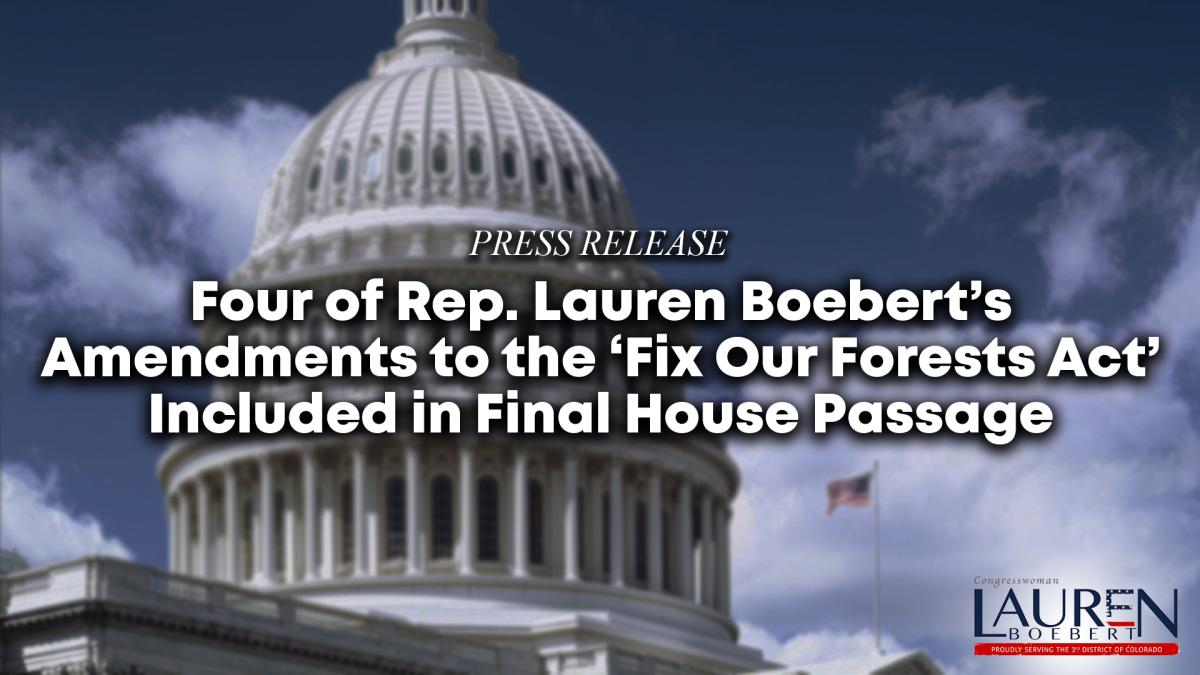Four of Rep. Lauren Boebert’s Amendments to the ‘Fix Our Forests Act’ Included in Final House Passage

Washington, D.C. — U.S. Congresswoman Lauren Boebert (CO-03) released the following statement after four of her active management amendments passed and were included in H.R. 8790, the “Fix Our Forests Act,” which passed the House of Representatives on a bipartisan vote of 268-151.
“America needs to do more to actively manage our forests and prevent catastrophic wildfires that are devastating our communities. Federal agencies have to stop spending billions of dollars on the backend putting out fires and shift to a comprehensive, proactive approach. The Fix Our Forests Act and my four amendments do exactly that and are the type of solutions needed in the West and Colorado. I thank House Natural Resources Committee Chairman Bruce Westerman for his support on all four of my amendments, and I urge the Senate to take up his critical legislation,” said Congresswoman Boebert.
Background, courtesy of the House Natural Resources Committee:
The Fix Our Forests Act is a historic and comprehensive package that will encourage active forest management and support community resiliency to wildfires by expediting environmental analyses, reducing frivolous lawsuits and increasing the pace and scale of forest restoration projects.
The bill will:
- Simplify and expedite environmental reviews for forest management projects
- Promote federal, state, tribal and local collaboration
- Deter frivolous litigation that delays essential projects
- Create a framework for prioritizing treatments in the forests at highest risk of wildfire
- Encourage adoption of state-of-the-art science and data for federal land managers
- Encourage active management to improve the safety of powerlines and other infrastructure
- Strengthen tools like Good Neighbor Authority and Stewardship Contracting
Information on Rep. Boebert’s included amendments:
Boebert Amendment #12: Clarifies existing authorities may be utilized to prevent wildfires in Fire Regimes IV and V
Amendment 12 makes an important clarification that expands the acres of at-risk forests that would be eligible for streamlined management authorities. Under current law, regimes 4 and 5 are subject to extensive “National Environmental Policy Act” (NEPA) requirements for active management. A fire regime map by county can be found HERE.
This amendment is critical to fire mitigation efforts across the states of Colorado, Wyoming, New Mexico, Arizona, California, Utah, Nevada, Oregon, Idaho, Montana, Michigan, Minnesota, Wisconsin, New York, Maine, West Virginia, New Jersey, Rhode Island, Missouri, Louisiana, Mississippi, Indiana, Ohio, Vermont, New Hampshire, Massachusetts, Virginia, North Carolina, Iowa, Florida, and Texas
Boebert Amendment #13: Ensures grazing is one of the hazardous fuel reduction activities authorized by the bill
Fuels treatments are effective, and federal agencies have made clear that “over 90 percent of the fuel treatments are effective in changing fire behavior and/or helping with control of the wildfire.”
Grazing animals play an important part in maintaining healthy ecosystems by controlling the ecological balance of vegetative species, reducing fire fuels that result from the accumulation of non-native plant biomass, and improving soil health by trampling plant residue and their own waste into the soil profile. Cattle, sheep, and goats can play a regenerative wildfire mitigation role that also provides for our food and fiber needs.
Boebert Amendment #14: Requires regional foresters to submit a plan through the Collaborative Forest Landscape Restoration Program for the treatment and removal of trees killed by or infested with bark beetles in Western states
The Bark Beetle epidemic has caused significant damage to roughly 100,000 square miles of forest in the western United States alone. Along the West Coast and through the Rocky Mountains, bark beetles have affected tens of millions of acres of forest. While bark beetles are native to U.S. forests and play important ecological roles, they can cause extensive tree mortality and negative economic and social impacts.
Spruce beetles have killed millions of trees on more than 1.8 million acres in Colorado since 2000 and provided increased fuels for wildfires. In Colorado, 2021 was one of the worst wildfire seasons our state has ever endured with the three largest fires in state history. Bark beetle epidemics and catastrophic wildfires are a significant threat. This can be minimized by thinning overgrown forests and removing hazardous fuels produced by beetle overpopulation.
Boebert Amendment #15: Requires regional foresters to submit a plan for the sale of Christmas trees and firewood on federal lands
Under current law, American families can purchase a permit from the forest service to cut Christmas trees from their favorite national forest as well as harvest any firewood, transplants, post and poles, and other forest products to improve forest health. We have seen successful Christmas tree and firewood harvesting operations in the state of Colorado, and this program has served as a locally based solution to help thin our overgrown forests.
According to the Forest Service, “The permit system helps to thin densely populated stands of small-diameter trees. Local forest health experts identify areas that benefit from thinning trees and tend to be the perfect size for Christmas trees. Removing these trees in designated areas helps other trees grow larger and can open areas that provide food for wildlife.”
For more information on the Fix Our Forests Act, click HERE.
###
For updates, subscribe to Congresswoman Boebert’s newsletter here.
